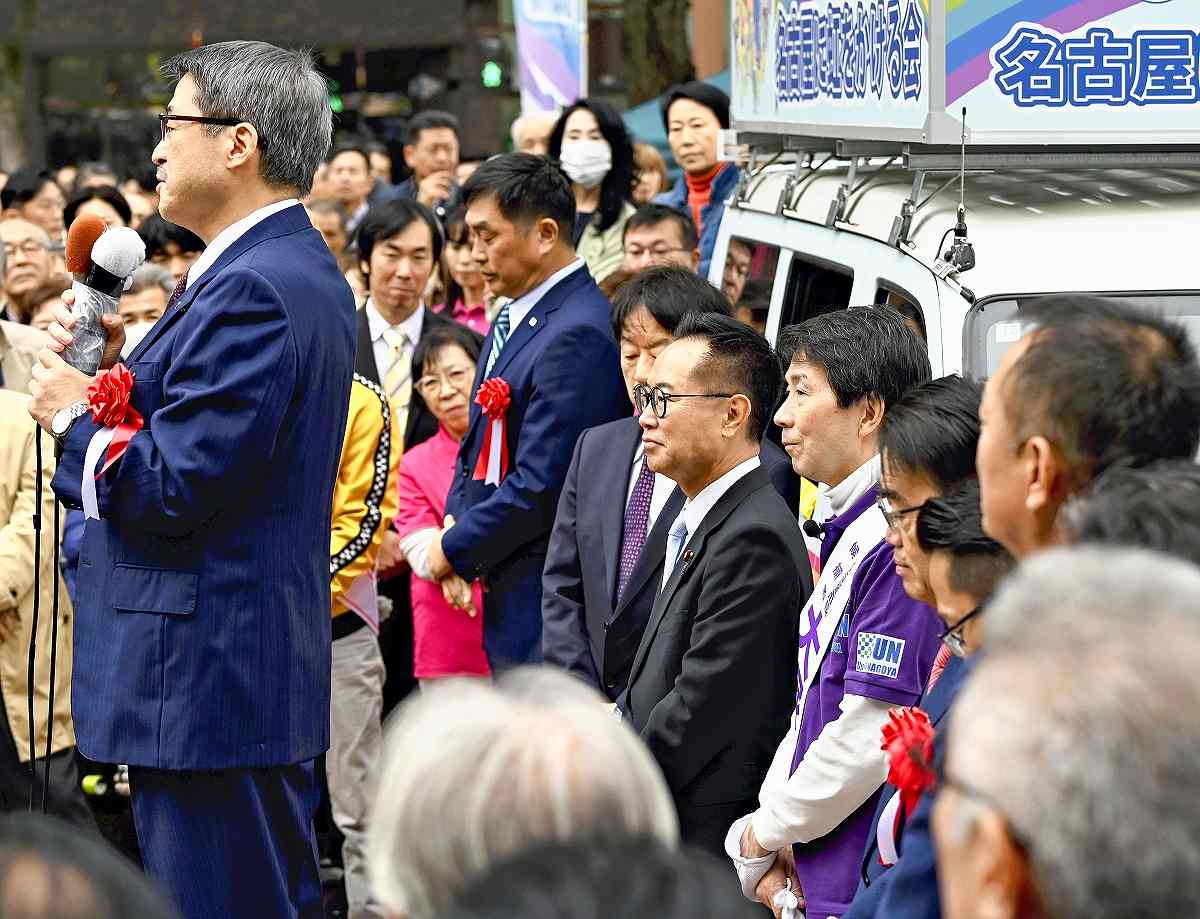Nagoya Mayoral Election Results Shock Established Parties; Former Upper House Member Supported by 4 Major Parties Defeated

People gather to support Kohei Otsuka in the Nagoya mayoral election campaign in Nagoya on Nov. 10.
17:53 JST, November 26, 2024
Several of Japan’s ruling and opposition parties were shocked by former Deputy Mayor Ichiro Hirosawa’s defeat of former House of Councillors member Kohei Otsuka in Sunday’s mayoral election in Nagoya, raising concerns that the public is becoming alienated from entrenched political parties.
Otsuka was supported by the Liberal Democratic Party, the Constitutional Democratic Party of Japan, the Democratic Party for the People and Komeito. There is a widely held view among the parties that Otsuka’s defeat was due to voters’ strong distrust of the established political parties. Each party will likely be forced to rethink their strategies for future races, including next summer’s upper house election, observers said.
130,000 votes
“Various parties supported him, including ours, but he was wiped out in the election. I think the citizens did not have much trust in the established parties,” Komeito Chief Representative Tetsuo Saito told reporters after attending a liaison meeting of the government and the ruling parties at the Prime Minister’s Office on Monday.
Liberal Democratic Party Secretary General Hiroshi Moriyama reported Otsuka’s defeat at the meeting, adding, “I want to keep these results in mind as we are preparing for next year’s upper house election.”
“Why did it turn out like this? The backlash against the established political parties was even greater than we had imagined. We need to seriously rethink our strategy for the upper house election,” an LDP executive admitted.
Otsuka is a veteran lawmaker who was elected to the upper house four times in a row, representing a constituency in Aichi, and has also served as acting leader of the DPFP.
In the mayoral election, he was not running against former Nagoya Mayor Takashi Kawamura, a member of the House of Representatives and co-representative of the Conservative Party of Japan. Kawamura, who had been the mayor of Nagoya since 2009, enjoys overwhelming name recognition due to his advocacy of measures such as lowering municipal taxes.
For that reason, there was some optimism in Otsuka’s camp at first that he would have a solid campaign supported by both the ruling and opposition parties.
However, Otsuka was ultimately defeated by Hirosawa, who ran on a platform of continuing Kawamura’s policies, by a margin of more than 130,000 votes.
LDP Executive Acting Secretary General Tatsuo Fukuda stressed at a press conference Monday that the party should “seriously consider” the mistrust of voters and that “we need to reform the party from now on.”
Tamaki: Total defeat
The DPFP was particularly shocked by Otsuka’s defeat.
With DPFP leader Yuichiro Tamaki and secretary general Kazuya Shimba in Nagoya to support Otsuka on Friday, Tamaki was forced to admit on X, formerly Twitter, that they had been “completely defeated” in the election.
“This defeat sapped the momentum the DPFP had gained from its success in the recent House of Representatives elections,” a DPFP member said.
Japan Innovation Party Representative Nobuyuki Baba said, “Voters are angry that the ruling and opposition parties, which were at odds in the lower house elections, have now joined forces. They are asking, ‘What on the earth are the established parties doing?’”
The JIP watched the mayoral election from the sidelines without committing itself to any candidate.
Attacks on social media
However, one notable factor in the election was a campaign of attacks on Otsuka on social media, likely to be intended to label him a “tax hike advocate.”
Since Hirosawa made “tax reduction” a key phrase of his campaign, the attempts to stick such a label to Otsuka are thought to have had some effect.
“We have entered an age where the information sent out via social media and its authenticity must be verified in some way,” Shimba said.
There have also been calls from both the ruling and opposition parties for measures to be taken to prevent the spread of malicious false information.
Komeito Secretary General Makoto Nishida raised the issue at a liaison meeting of the government and the ruling parties on Monday, saying, “There is a need to deeply discuss and research the negative effects of false and erroneous online election information.”
He also ordered the government to “consider ways to ensure the soundness of information spaces.”
Top Articles in Politics
-

Japan PM Takaichi’s Cabinet Resigns en Masse
-

Sanae Takaichi Elected Prime Minister of Japan; Keeps All Cabinet Appointees from Previous Term
-

Japan’s Govt to Submit Road Map for Growth Strategy in March, PM Takaichi to Announce in Upcoming Policy Speech
-

LDP Wins Historic Landslide Victory
-

LDP Wins Landslide Victory, Secures Single-party Majority; Ruling Coalition with JIP Poised to Secure Over 300 seats (UPDATE 1)
JN ACCESS RANKING
-

Producer Behind Pop Group XG Arrested for Cocaine Possession
-

Japan PM Takaichi’s Cabinet Resigns en Masse
-

Japan Institute to Use Domestic Commercial Optical Lattice Clock to Set Japan Standard Time
-

Man Infected with Measles Reportedly Dined at Restaurant in Tokyo Station
-

Israeli Ambassador to Japan Speaks about Japan’s Role in the Reconstruction of Gaza























